Nvidia Earnings Fuel Rally in Global Technology Stocks

© Michael M. Santiago/Getty Images

© Michael M. Santiago/Getty Images

© Tom Williams/CQ-Roll Call, Inc via Getty Images

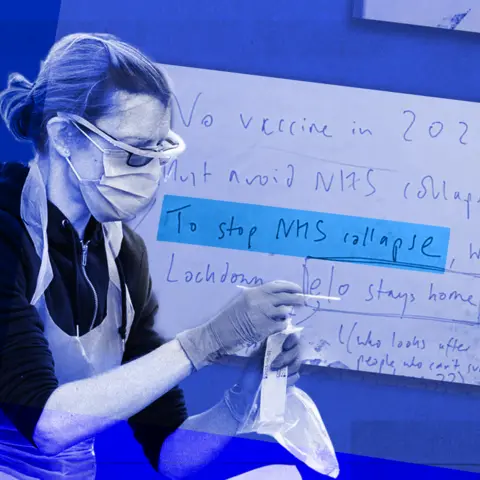 BBC
BBCIt was the most momentous event in UK history since World War Two. As a new virus took hold, millions of us were told to stay at home and billions of pounds were spent propping up the country's economy.
The Covid inquiry will publish its second set of findings later today, looking in detail at the huge political choices made at the time - including how lockdowns were introduced, the closure of businesses and schools, and bringing in previously unthinkable social restrictions.
"Did the government serve the people well, or did it fail them?" asked the lead counsel at the start of this part of the inquiry in 2023. Since then more than 7,000 documents have been made public from the time, including WhatsApp chats and emails, private diaries and confidential files.
Here, BBC News has picked out some of the urgent messages and scribbled notes that shine a light on how critical decisions were taken in 2020.
On 2 January 2020 an update appears on ProMed, a service used by health workers to warn of emerging diseases.
"World Health Organization in touch with Beijing after mystery viral pneumonia outbreak," it says.
"Twenty-seven people - most of them stallholders at the Huanan Seafood Wholesale Market - treated in hospital."
The next day England's deputy chief medical officer, Jonathan Van Tam, sends the bulletin on to Peter Horby, a professor at Oxford University and chair of Nervtag, a group that advises the government on new viral threats.

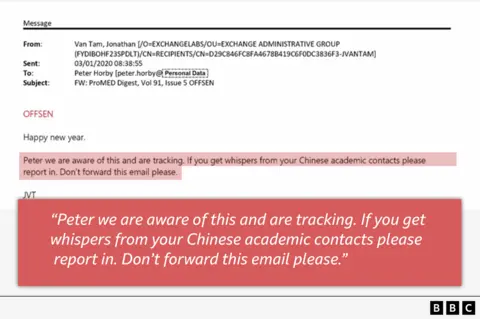
By the end of January, it's clear the health authorities in Wuhan have a major problem on their hands.
The deputy ambassador to China, Christina Scott, sends a cable back to London marked DIPTEL BEJING (Sensitive) comparing the situation to the outbreak of another virus - SARS - in 2003.
"Hubei province on lockdown; multiple cities have transport restrictions. Memory of SARS cover-up ensures residual distrust of government response," it says.
"They will do everything they can to quickly control this outbreak. But the challenge of doing so is substantial."
The virus spreads to Hong Kong and South Korea and then to Iran and northern Italy.
At lunchtime on Saturday 7 March the UK's then prime minister, Boris Johnson, is chatting on WhatsApp to his health secretary Matt Hancock ahead of the England vs Wales game at Twickenham.

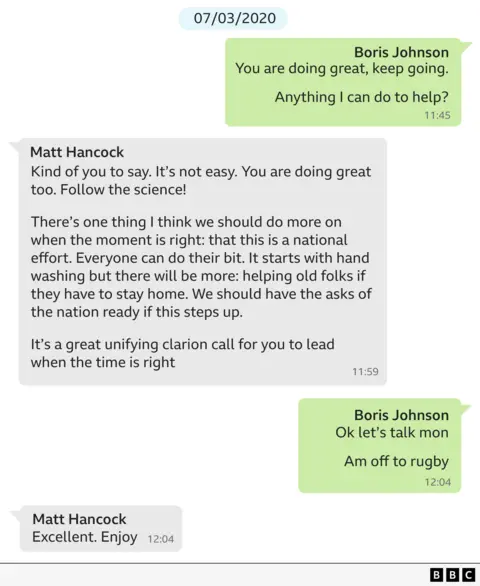
Days later, the Cheltenham horse racing festival goes ahead and Atletico Madrid fans are allowed to fly from Spain to Liverpool to watch their team play in the Champions League.
The government's strategy, backed by its scientific advisers, is to try to contain early outbreaks by isolating those with the virus and tracing any contacts.
The plan is then to move to a "delay phase" as full community transmission is established – using policies like home isolation advice for those with symptoms to "flatten the curve" of the pandemic so that hospitals do not become overwhelmed.

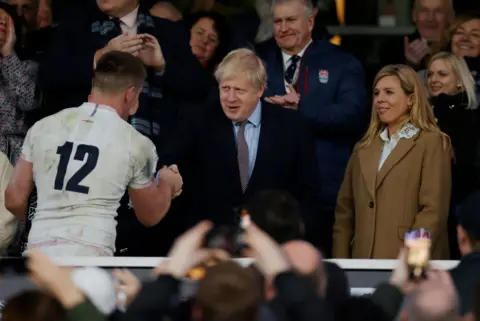 Getty Images
Getty ImagesBut the virus is spreading much faster than expected and it‘s quickly becoming clear to many scientists that far stronger action will be needed.
On Friday 13 March, two senior No 10 officials are sitting in a key meeting of scientific advisers in Whitehall.
"WE ARE NOT READY," one writes in capital letters in his notepad. The other leans over and crosses out "NOT READY", replacing it with an expletive.
That weekend, the prime minister's chief adviser, Dominic Cummings, is locked in a series of meetings with the PM and a handful of select staff as a new strategy takes shape.

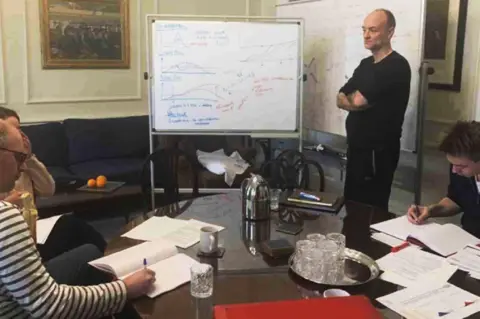 Covid Inquiry
Covid InquiryGrainy smartphone images show whiteboards in No 10 full of hand-drawn charts and scrawled bullet points.
One graph suggests that, if the virus was allowed to run its course without any restrictions in place, then more than 100,000 people would die "in [hospital] corridors" in the coming wave.

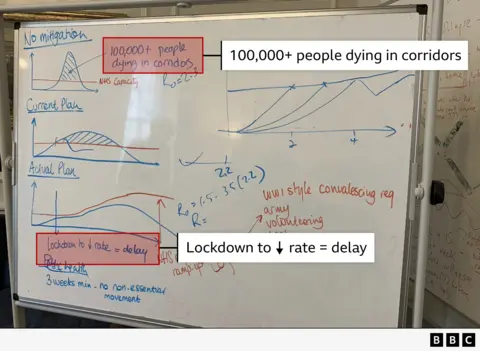
On Sunday 15 March, Cummings sends a WhatsApp to Johnson:
"FYI – [Patrick] Vallance [the chief scientific adviser] is on board with what will NEVER be discussed as Plan B."
"[In a] nutshell: we move through the gears to [do] whatever we need to stop NHS collapse and buy time to increase capacity."
Over the following week, Covid rules across the UK are tightened.
People are advised, but not legally required, to avoid all non-essential contact and work from home where possible. Then schools are closed, followed by pubs, restaurants, gyms and cinemas.
But still there are concerns that even those measures are not strong enough. On Sunday 22 March, London's mayor, Sadiq Khan, writes a private letter to Johnson.

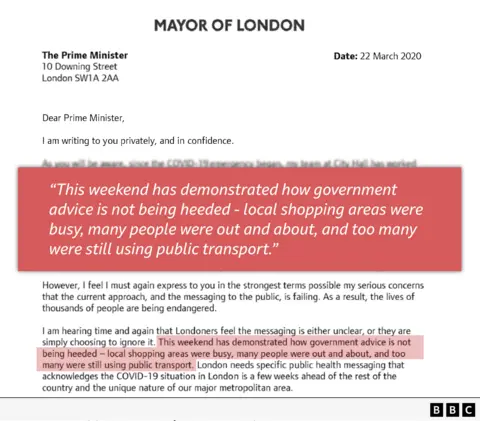
The next evening, in a televised address watched by 27 million people, the prime minister tells the public they must stay at home as he announces the first national lockdown.
It will now be up to the inquiry to decide if making that call earlier could have saved lives and ultimately reduced the total time that people had to stay locked indoors.
Over the next month some hospitals do come under severe pressure with intensive care units spilling into corridors and side rooms. Pre-planned or elective care is put on hold but at no point does the NHS have to turn away emergency patients.
Covid infections, hospitalisations and deaths start to fall.
But the cost of lockdown restrictions is huge: education is disrupted, loneliness and mental health problems get worse, and jobs and businesses are impacted.
On 22 May, Johnson sends a handwritten note to his officials asking for a plan to "start operation BOUNCEBACK".

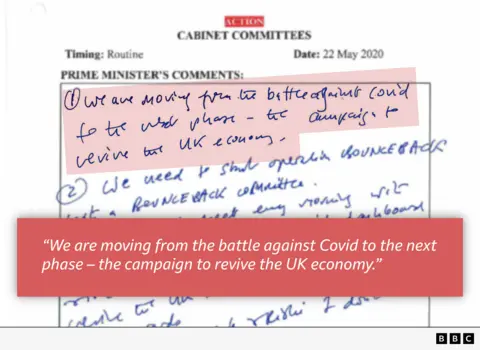
That month some restrictions begin to be lifted – soon groups of six are able to meet outdoors and schools start a phased re-opening.
In the summer, then-chancellor Rishi Sunak tries to boost the economy with his Eat Out to Help Out scheme - 50% off food and drinks for three days a week in August.
The idea is well received by the hospitality industry but there are concerns about the health impact.
On WhatsApp (with spelling mistakes), Hancock warns Simon Case, then the most senior civil servant in Downing Street, that it's causing problems in intervention areas - that’s those local authorities with the highest infection rates.

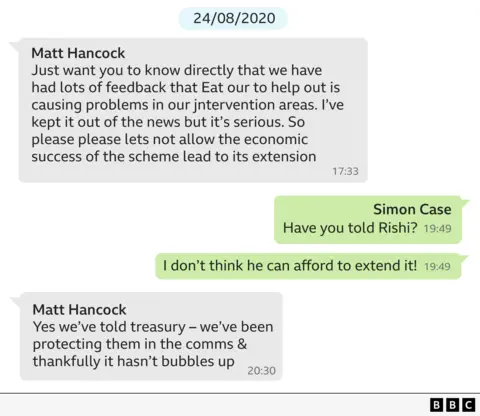
In his evidence to the inquiry, Sunak plays down a link between his scheme and the spread of the virus saying a second wave "happened in every other country in Europe".
But that tension – between controlling Covid and protecting the economy – becomes even more intense through the autumn.
Many scientists advising the government want to see tighter rules. They campaign for a short "circuit breaker" lockdown to try to drive down infections.
At times the documents suggest the prime minister supports tougher restrictions, at others he appears determined to avoid another strict national lockdown at all costs.

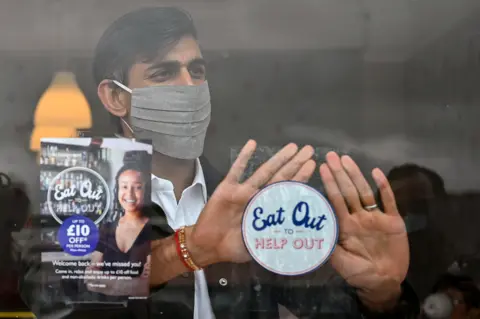 PA Media
PA MediaOn WhatsApp Johnson's closest aides complain about his decision-making – using an emoji of a broken trolly as he appears to swerve from one policy position to another.
"This government doesn't have the credibility needed to be imposing stuff within only days of deciding not to," writes Case, who is now the new cabinet secretary, to Cummings and Lee Cain, No 10 director of communications, on 14 October.
"We look like a terrible, tragic joke. If we were going hard, that decision was needed weeks ago. I cannot cope with this."
In his testimony to the inquiry, Case later says he regrets expressing his "at-the-moment frustrations" with Johnson, whom he "barely knew" at the time.
In his evidence, Johnson defends his own leadership style, saying his views changed with the scientific evidence, and he often adopted certain positions because he wanted to hear the counter arguments.
As the nights draw in that autumn, it becomes clear that existing restrictions in England - including a 10pm curfew and the so-called tiered system of local controls - are not going to be enough to control the virus.
By the end of October, the prime minister's frustration is obvious in the long note he scrawls at the end of a Covid briefing document marked OFFICIAL/SENSITIVE.

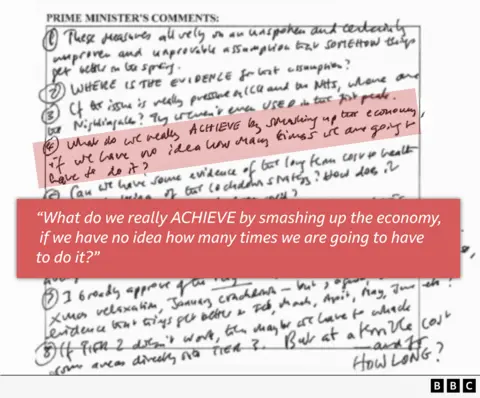
In tightly-spaced handwriting, Johnson pens 22 detailed points over two A4 pages of the document.
He approves of strengthening some local restrictions but bemoans the "terrible cost" and wonders "for HOW LONG?"
"Is NHS T&T [test and trace] actually achieving ANYTHING?" he asks at one point.

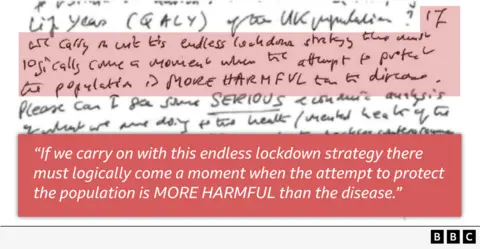
A week later, on 5 November 2020, England does enter its second national lockdown, this time lasting four weeks, although most schools remain open.
By this point many decisions are being taken independently by the four nations of the UK. Both Wales and Northern Ireland put in place versions of a circuit breaker lockdown, while in Scotland stricter rules are imposed in the central belt.
The plan is still to allow families and friends to meet up at Christmas.
But by mid-December a new, more infectious variant of the virus is spreading and millions living in the south-east of England are told at short notice that Christmas mixing will be cancelled.
In January 2021, a third and final full national lockdown follows across the UK, as the winter wave peaks and the NHS starts rolling out millions of doses of the first Covid vaccines.
Five years on from those dramatic 12 months, the inquiry's findings are long-awaited, particularly by the 235,000 families who lost loved ones in the pandemic.
The messages and documents highlighted here are just a snapshot - the report due later will run to around 800 pages.
It will examine some of the key questions in much more detail: the timing of lockdowns, the impact of restrictions on the most vulnerable, and public confidence in the rules amid reports of partying in Downing Street and other alleged rule breaches.
Groups representing thousands of bereaved families want individuals working in government at the time to be held to account for any pandemic failings.
But - above all - they want the state to learn lessons from any mistakes and be better prepared if and when the next unknown virus arrives on our shores.
Some documents in this article have been recreated. All contain the original texts including spelling mistakes and typographical errors.
Additional reporting: Pilar Tomas and Ely Justiniani, BBC Visual Journalism Unit.
Top image credit: Getty/BBC

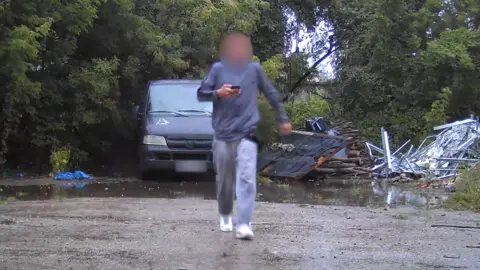 SBU
SBUIn July this year a 17-year-old travelled 500 miles from his home in eastern Ukraine to collect a bomb and a phone hidden in a park in the western city of Rivne.
He says he was promised $2,000 (£1,520) to plant the bomb in a van used by Ukraine's military conscription service.
"When I was connecting the wires, I thought it could explode then. I thought I might die," he told the BBC.
Vlad is one of hundreds of children and older teenagers who the Ukrainian government alleges have been recruited online by Russia, and offered payment to carry out sabotage and other attacks against their own country. His name has been changed to protect his anonymity.
He says he was told to set up the phone to live-stream the scene to his handler so they could remotely detonate the device when somebody entered the vehicle.
However, Ukraine's SBU security service had been watching and foiled the attack. Vlad - now 18 - is awaiting trial on terrorism charges that potentially carry a 12-year prison sentence.
Sitting in Rivne's heavily guarded detention centre with his lawyer beside him, he acknowledges that he could have helped kill somebody.
"I did think about it. But nobody likes conscription officers," he says. "I thought: Well, I'll be like everyone else."
The SBU says that over the last two years more than 800 Ukrainians have been identified as having been recruited by Russia - 240 of them minors, some as young as 11.
However, cyber security expert Anastasiia Apetyk, who teaches courses about internet safety in Ukraine, is aware of even younger cases. "They tried to recruit children aged nine or 10," she says.

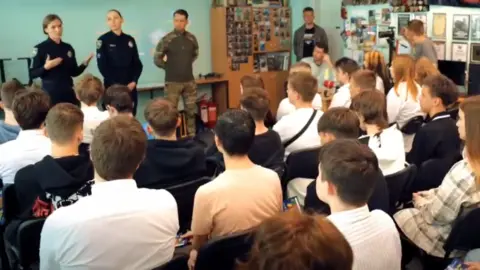 SBU
SBUAndriy Nebytov, Deputy Head of Ukraine's National Police, says there is a deliberate strategy to seek out the vulnerable who can be manipulated.
"Children do not always fully realise the consequences of their actions," he says.
"The enemy is not ashamed of using minors for making explosives out of household chemicals, planting them in various locations such as army recruitment offices or police stations."
The SBU says recruitment primarily takes place on the Telegram app, but also on TikTok, and even on video game platforms. Officials says those who are recruited are almost always motivated by money rather than pro-Russian sympathies.
Vlad says he does not support Russia and had no previous involvement with crime.
He had joined two Telegram channels and posted that he was looking for remote work. Within half an hour, a man calling himself Roman replied. When they later talked on the phone, Vlad says Roman spoke Russian with a street accent.

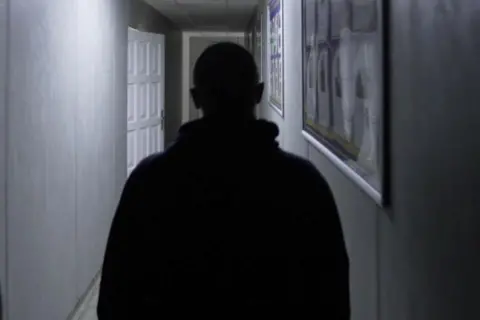 SBU
SBUVlad says he was initially reluctant but was persuaded to take on a series of increasingly dangerous tasks. First, he was told to collect a grenade but when he reached the designated location it wasn't there. He was paid $30 anyway.
A few days later came another job - to set fire to a van belonging to a conscription centre, film it and run.
For that attack, Vlad says he received about $100 in cryptocurrency - much less than the $1,500 he'd been promised. Roman told him he would get the rest if he planted the bomb in Rivne.
The Telegram channels the BBC has seen where recruitment takes place are not explicitly pro-Russian, but they amplify anger felt by some Ukrainians towards the conscription service, which has been dogged by allegations of brutality and corruption.
Using a burner phone and an alias we joined several we were tipped off about.
The channels contained clips of fires and explosions which they claimed were carried out on their orders. But the BBC has not been able to verify the circumstances surrounding those videos.

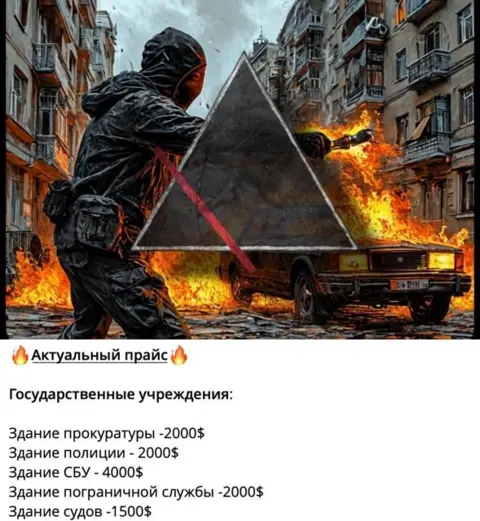 Telegram
TelegramOne account we contacted immediately offered payment, either in cryptocurrency or via bank transfer, to carry out arson. We were told to contact a second account for more details and then received a message with a price list detailing how much they offered to pay for different targets.
The payments ranged from $1,500 for setting fire to a post office to $3,000 for a bank. Banks were worth more, they explained, because security glass made them harder to attack.
"You either need to pour petrol inside or throw a few Molotov cocktails inside," the account advised.
But even ordinary Ukrainians looking for employment can find themselves offered money to carry out sabotage.
We found adverts offering high pay for unspecified part time work posted in a variety of unrelated Ukrainian Telegram groups, including some geared at refugees and even beauty tips. When we followed one up, a recruiter again offered thousands of dollars for arson attacks and asked us to send videos as proof.
"I need all the arson I can get," they messaged. "Finding a reliable person is far more difficult than parting with money. That's why I pay exactly what I say and I do it very quickly, usually within a couple of hours after receiving the video."
The BBC reported a number of these channels, accounts, chats and bots to Telegram, which removed a few but not most of them. One of the channels that is still active has grown by over 750 subscribers since we started monitoring it, meanwhile an account that we told Telegram had directly offered us payment for an arson attack is still live.
In a statement, Telegram said: "Calls to violence or destruction of property are explicitly forbidden on Telegram and are immediately removed whenever discovered."

 SBU
SBUUkrainian officials have publicly named members of Russia's intelligence agencies they suspect of acting as handlers to saboteurs.
The BBC has not been able to independently verify that the Russian state itself is responsible.
However, several European governments have said that they have evidence of Russian agents recruiting young men to carry out acts of vandalism, arson, or even surveillance in their countries. In the UK, six men were jailed for their part in a Russian-ordered arson attack on a London warehouse providing aid to Ukraine.
In Ukraine, hundreds of alleged saboteurs are awaiting trial, but for some the consequences can be deadly. Several suspects have been killed by explosives they were carrying.

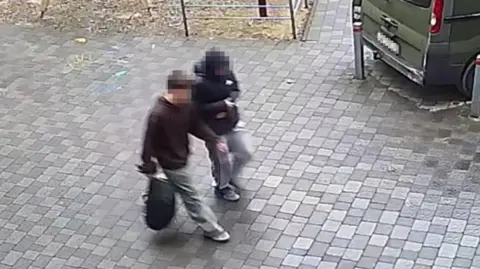 SBU
SBUThe SBU claims Russian handlers have deliberately detonated devices remotely, knowing their agents would be killed.
In March, a 17-year-old died and a 15-year-old was badly injured when a bomb they were believed to be taking to a rail station in Ivano-Frankivsk exploded.
The BBC put the SBU's allegations to the Russian Embassy in London. In a statement it accused Ukraine of a similar sabotage campaign using Russian citizens.
"The practices that you mention have become a trademark of the Ukrainian special services. In particular: recruitment of civilians, including children, to carry out arson, sabotage or bombings against people, buildings or vehicles."
There have been reports attributing acts of sabotage inside Russia to Ukrainian recruitment on Telegram. But again, it is notoriously difficult to verify who exactly is behind these attacks.
Meanwhile Vlad has a message for others tempted by the recruiters.
"It's not worth it. They will either cheat you, and then you will end up in prison just like me, or you can take a bomb in your hands and it will simply blow you up."

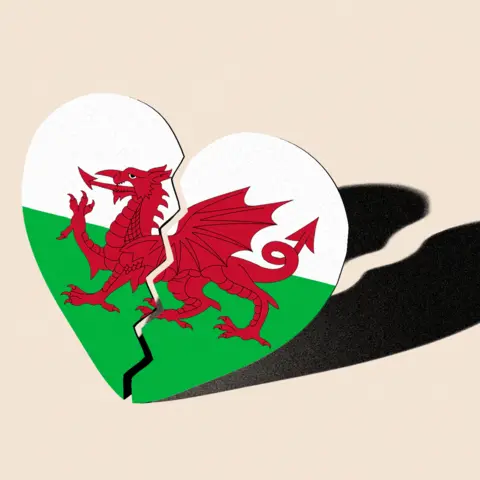 BBC
BBCThe vote count at the Caerphilly by-election looked like many others. Tables were arranged in the middle of a sports hall, black ballot boxes started to arrive and the counting began.
But camped out at the hall in this ex-coal mining town, known for its cheese, was a throng of journalists and photographers from London – a rare sight for an election to the Welsh Parliament.
Something bigger was afoot: that by-election last month was as much about who was going to lose as it was about who was going to win.
The losers were Labour. They trailed in third place behind Plaid Cymru and Reform UK, winning just 11% of the vote. It marked Labour's first major electoral defeat in Caerphilly for 100 years.
If a similar result is replicated across the whole of Wales at the Senedd election next May - which will switch to a new proportional representation voting system - then the party could face an existential threat.

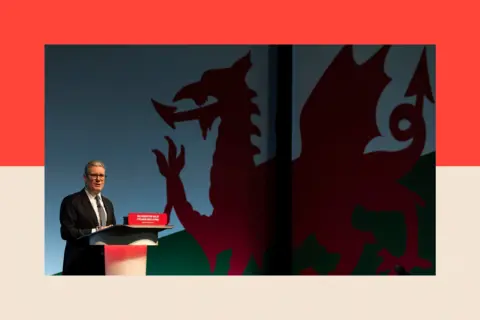 Getty Images
Getty ImagesLabour insiders have already warned that the key elections in May 2026 (which will take place in Scotland and some English councils too) could be a "tipping point" for the prime minister.
It creates yet another headache for the prime minister Sir Keir Starmer who has been dealing not only with speculation about challenges to his leadership, but also questions about the chancellor's tax plans ahead of next week's Budget.
When it comes to the question of Wales specifically, the political commentator Richard Wyn Jones has described the potential for Labour losing power next May as "seismic".
It has been the biggest party in Wales at every UK parliamentary election since 1922, and the largest in the Senedd at every election since 1999. This would be the sort of change that the vast majority of people will not have seen – or possibly expected – in their lifetimes.
And the ramifications for the party and the prime minister are clear. Not only has he had to deal with a crisis-made-in-Downing Street about his own leadership, but there are also potential threats to his future next May.
As one source told me: "Keir Starmer would be the first Labour leader to lose Wales.
"It will not matter after that who blames who for what - history will remember we lost Wales."
In Cardiff Bay, Labour has been in power since the Senedd was established 26 years ago.
As next May's election looms, there are serious questions about its record, not least on the NHS, which accounts for 55% of the Welsh government's £27bn budget.
Cutting waiting times is First Minister Eluned Morgan's number one priority and, over the last year, the trend for overall waiting lists is just about downwards. But lists are still high, despite £50m of additional funding last autumn and £120m in June.

 Getty Images
Getty ImagesThe Welsh government's current target is to eliminate waiting times of more than two years by next March, and for the overall waiting list to be cut by 200,000 between April 2025 and March 2026.
Latest figures show that more than 8,000 patients are still waiting more than two years, compared with just 168 in England. The overall list is still hovering near where it was in April at just under 800,000.
Opposition parties may be hoping that voters have already made up their minds on the Labour record, however.
The Welsh party was in the headlines for the wrong reasons last year, during Vaughan Gething's brief reign as first minister, following a row over donations to his leadership campaign.
He maintained that all current rules were followed and said he regretted the "anxieties" caused by the donations.

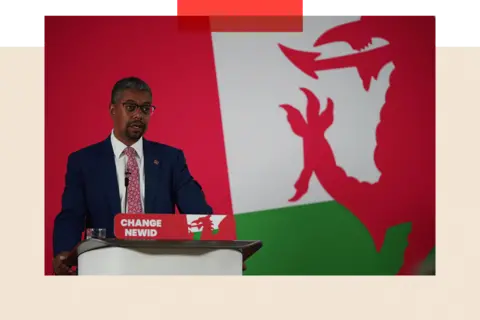 Getty Images
Getty ImagesIt was an ugly period for the Labour group in the Senedd, which split acrimoniously over the matter.
According to Cathy Owens, a political consultant and former Labour special adviser, the "internecine warfare" kick-started the party's drop in the polls in Wales.
Welsh Labour has not been immune to the party's decline in popularity across the rest of the country either.
At the start of the year, Labour, the Conservatives and Reform UK were all averaging about 25% across Britain. In May that all changed: for more than five months, Reform's average polling has hovered around 30%, while the two other parties have now fallen below 20%.
Cathy Owens believes the party needs to embrace the "hanging baskets" theory of politics - the idea that voter attitudes can be boosted by highly visible changes (hence flower-filled baskets).
"Voters want to see the good stuff immediately, and they're not," she says. "All people see are negative headlines and there is no exclusivity for Wales about this. Welsh voters are reading and responding in the same way as [others]."

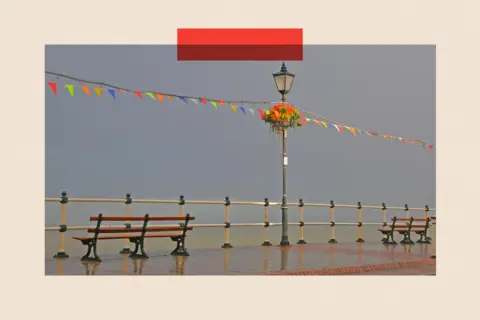 Getty Images
Getty ImagesThen there is the question of whether Labour governments in Westminster and the Senedd are working well for Wales.
There have been benefits, such as £1.7bn of extra funding announced by Rachel Reeves in last year's Budget, along with funding for coal tip safety and investment in Wales's railways. But the UK party has not delivered on a long list of Welsh Labour demands.
For example, Welsh Labour wants the Barnett formula reformed (the system that awards Treasury cash to devolved nations), plus they want devolution of the Crown Estate so that profits from Crown-held lands inside Wales go to the Welsh government, as well as a loosening of restrictions on the Welsh government's ability to borrow.
One Welsh Labour source argues that Eluned Morgan needs to be firmer on these demands. "We all hate it when the first minister says she is going to pester Keir Starmer and ask him for something.
"It's as if she is asking a friend to lend her a tenner to buy a round [in the pub]."

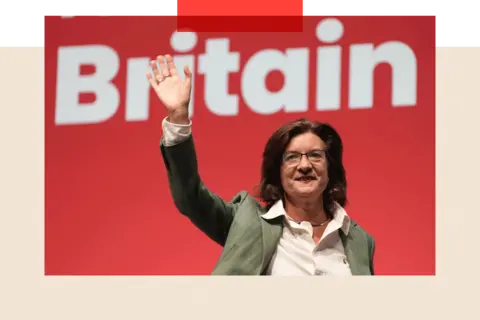 PA Wire
PA WireBut others have more sympathy given the context.
"If anyone thought that a UK Labour government could make up for 14 years of austerity on things like transport in such a short space of time," says Ms Owens, "then that was not going to happen."
As Labour struggles, two alternatives have emerged. Plaid Cymru has been trying to portray itself more as a government-in-waiting - and achieved success in the Caerphilly by-election.
They promise to build more surgical hubs than Labour to help bring down NHS waiting lists; to pilot a scheme to give extra money to Wales's poorest parents; to invest £800m to expand Wales's childcare options; and to introduce favourable business rates for small Welsh retailers.
Its ultimate goal remains independence but its current leader, Rhun ap Iorwerth, has taken a fresh approach, acknowledging that the idea of Wales going it alone frightens some voters.
At its conference last month, the party promised its plan for independence would not come until the second term of a Plaid-led Welsh government.
One Welsh Labour source has their own take on this. "No one in Wales thinks Wales will actually become independent," the source says.
"People are voting for Plaid Cymru because they're cheesed off with Labour and they now have an alternative."
Reform UK, meanwhile, is a more curious case from a Welsh perspective: it came second under the winner takes it all first-past-the-post vote in the Caerphilly by-election, getting 36% of the vote.
Yet it does not have a Welsh leader, nor a specific set of Welsh policies.

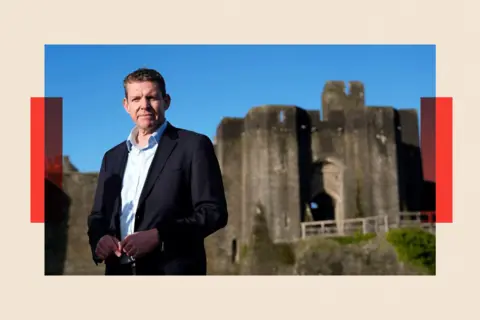 PA Wire
PA WireThe party has, however, called for the Welsh government to scrap its Nation of Sanctuary programme, which is designed to help asylum seekers and refugees. (The programme has cost £55m since 2019, less than 0.5% of Welsh government spending, with £45m of the funding allocated to Ukrainians.)
The party also says it would scrap the two-child benefit cap, which affects about 21,000 families in Wales, according to government statistics published last year.
As for the Welsh Conservatives, they concede in both public and private that next May will be tough, with the party's economy and rural affairs spokesperson, Samuel Kurtz, telling the BBC in October that the Tories were still "paying a penance" for their time in national government.
In the early hours after the Caerphilly defeat, the former first minister, Lord Carwyn Jones, urged the party not to descend into a "war of words" between Westminster and Cardiff Bay.
The plea is not being completely heeded. Some accuse the national party of complacency.
"Labour people in Wales have been trying to send a message up the M4," argues one senior Labour source. "The UK government needs to move faster and further on its commitments [to Wales] and take on board how big a risk next May is."
One source described the prime minister as a "top-down ivory tower leader" – a common refrain from some Labour politicians who think Sir Keir lacks a proper grasp.
Others argue the local campaign was chaotic and lacked focus – especially on social media – until Westminster figures got involved.
"Welsh Labour has not got the capacity, not got the right people in there," says one Westminster source. "Caerphilly was absolute carnage."

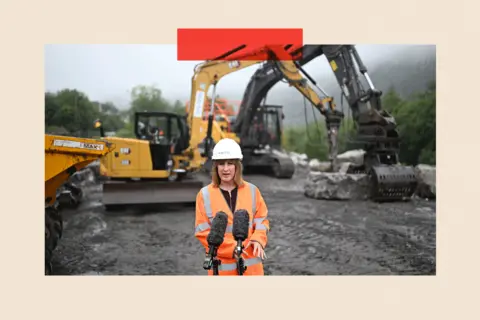 PA Wire
PA WireLabour says that next May's campaign will be led by Eluned Morgan. "Anything else will fail," one Member of the Senedd (MS) warned.
Some assembly members have been concerned about too much of a "London" influence creeping into the campaign ahead of next year's election.
The deputy First Minister, Huw Irranca-Davies, told me that the campaign would be "led by Eluned Morgan and Welsh Labour", but added, "We will definitely draw in all the talents in order to help as well."
The Treasury Minister and Swansea West MP Torsten Bell will act as a link between Cardiff and Westminster.
One source said next May would be a "presidential-style" operation.
So can Labour avoid defeat in the Senedd?
Plenty of Labour politicians have said in public that the party can turn things around - although the national party may well find itself distracted by its own leadership speculation.
Last week, allies of the prime minister briefed journalists about an imminent leadership threat from the English Health Secretary Wes Streeting.
Streeting dismissed the claims as "nonsense". Yet the turmoil certainly won't have helped to focus minds in London on the party's problem in Wales.
Many in Welsh Labour are hoping for big investment announcements from their colleagues at Westminster, such as the new nuclear power station on Anglesey announced recently.
The question is, will it be enough?
Alun Davies, who is assembly member for Blaenau Gwent, published a letter he sent to local party members, recalling his experiences recently on the doorstep.
"It can't get any worse," he said voters had told him. "And you lot need a kick."
Another source said that their biggest concern was a "baked-in defeat" and "not enough time to turn it round".
"If we could make really significant inroads in waiting times, and get significant funding in the Budget, it might at least help us build a narrative that two Labour governments working together is better for Wales," the source added.
But the one word slogan that propelled Labour to a landslide win at last year's general election could come back to haunt the party in Wales: change.
Labour's opponents in Wales sense that voters may just be ready for it after more than a century.


BBC InDepth is the home on the website and app for the best analysis, with fresh perspectives that challenge assumptions and deep reporting on the biggest issues of the day. You can now sign up for notifications that will alert you whenever an InDepth story is published - click here to find out how.

 Getty Images
Getty ImagesYounger Australian teenagers on Instagram, Facebook and Threads are being told their accounts will be shut down ahead of the country's social media ban for under-16s.
Meta, which owns the three brands, said it had begun notifying users it believes to be between 13 and 15 years old by text, email and in-app messages that their accounts would start being deactivated from 4 December.
The ban in Australia comes into force on 10 December. It affects a number of platforms which also include TikTok, YouTube, X and Reddit.
Prime Minister Anthony Albanese said the "world-leading" ban was aimed at "letting kids be kids". Meta and other firms oppose the measure but said they would comply.
Australia's internet regulator has estimated there are 150,000 Facebook users and 350,000 teens on Instagram in the 13-15 age bracket.
From 4 December, children aged below 16 will not be able to create accounts on Meta's social media platforms.
The company said it was asking young users to update their contact details so they could be notified when they became eligible to open an account.
They can download and save their posts, videos and messages before their accounts are shut down.
Meta said that teens who said they were old enough to use Instagram, Facebook and Threads could challenge the restriction by taking a "video selfie" to be used in facial age scans.
They could also provide a driver's licence or other government issued-ID.
All these verification methods were tested by the UK-based Age Check Certification Scheme (ACCS) earlier this year, in a report commissioned by the Australian state.
While the ACCS said that all methods had their merits, it added: "We did not find a single ubiquitous solution that would suit all use cases, nor did we find solutions that were guaranteed to be effective in all deployments."
Social media platforms which fail to take "reasonable steps" to block under-16s face fines of up to A$50m (£25m).
"While we are working hard to remove all users who we understand to be under the age of 16 by 10 December, compliance with the law will be an ongoing and multi-layered process," Antigone Davis, vice-president and global head of safety at Meta, told Reuters Financial.
Meta wants to see a law where under-16s have to get parental approval before they download a social media app.
The firm told Australia's Seven News: "Teens are resourceful, and may attempt to circumvent age assurance measures to access restricted services."
But it said: "We're committed to meeting our compliance obligations and are taking the necessary steps to comply with the law."
Australia's e-Safety Commissioner, Julie Inman Grant, said the ban was aimed at proctecting teens "from pressures and risks they can be exposed to while logged in to social media accounts".
In a move seemingly to avoid being included in the ban, gaming platform Roblox this week announced that children under 16 would be unable to chat to adult strangers.
Mandatory age checks will be introduced for accounts using chat features, starting in December for Australia, New Zealand and the Netherlands, then the rest of the globe from January.
The e-safety commissioner has published a list of which social media platforms will be impacted by the age ban.
They are:
Platforms not included are:







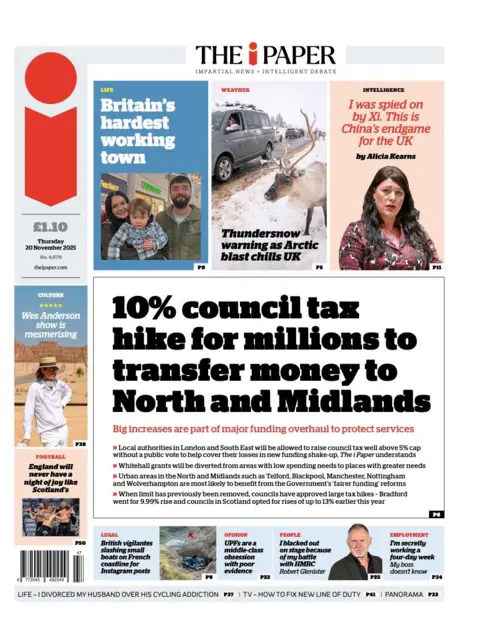

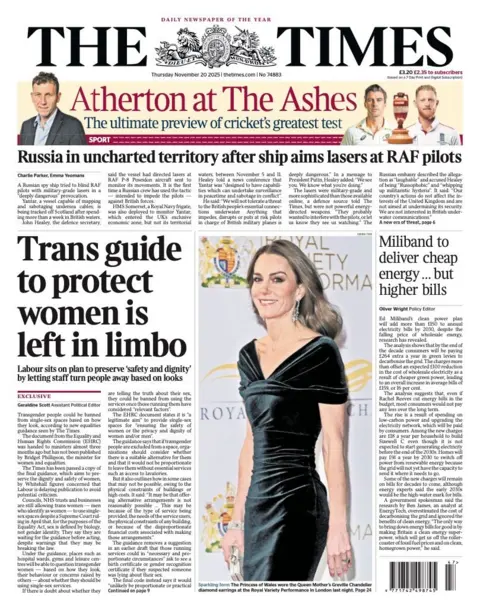

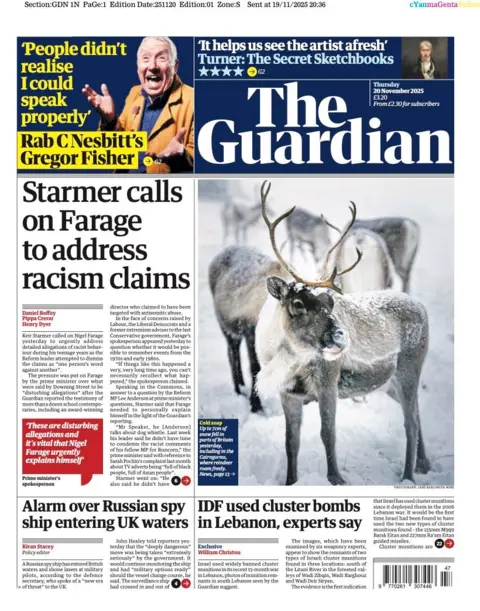

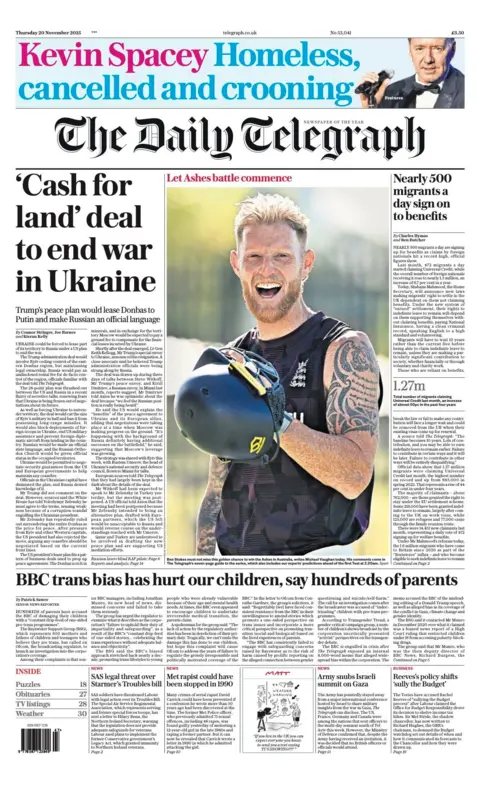

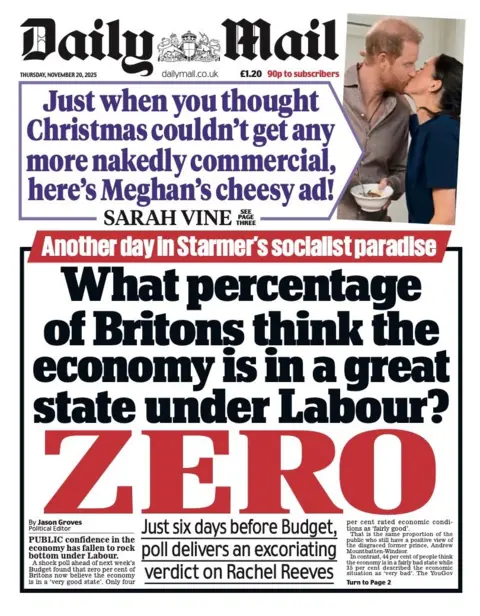

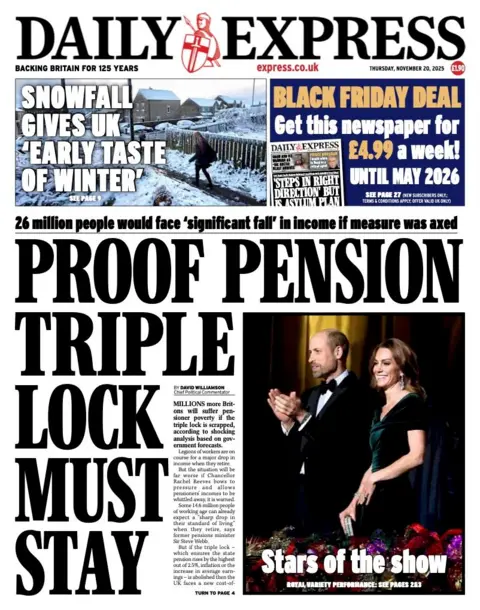

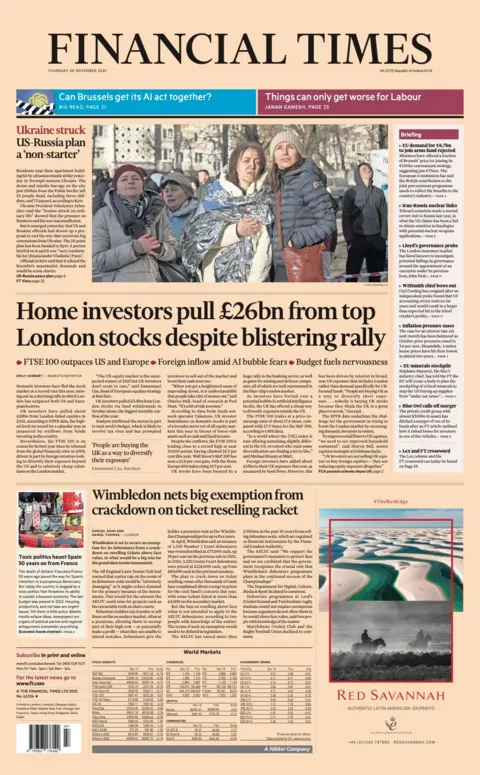

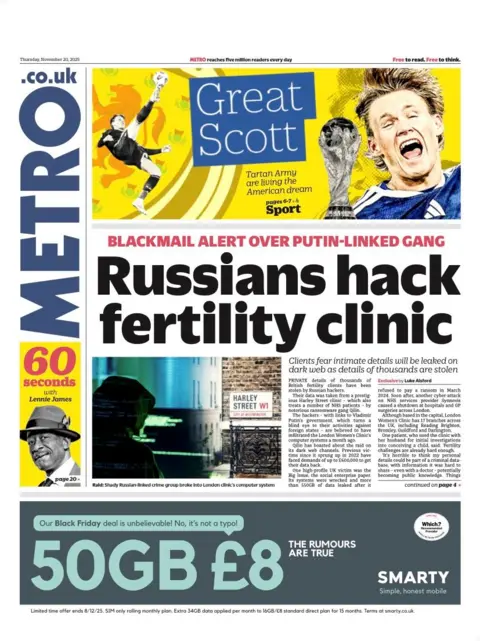




Sign up for our morning newsletter and get BBC News in your inbox.



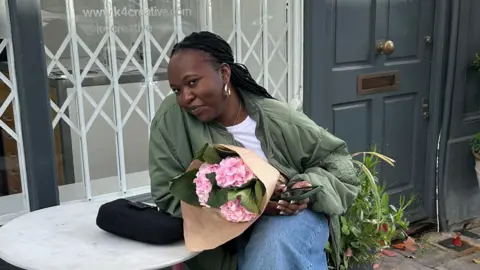 BBC
BBCPerfectionism has a great reputation. It's one of the most common answers used in a job interview to spin the dreaded "What's your weakness?" into a humblebrag.
For many, it's about striving for excellence or working tirelessly to reach the highest standard.
But what happens when these high (and sometimes unrelenting) expectations of yourself are exactly what's holding you back?
"I know perfectionism is an illusion, but I am always trying to chase it," admits 25-year-old Aswan.
Even in the workplace, she feels the pressure, "I know that I can make a mistake and I won't lose my job, yet I constantly feel like I'm one strike away from being fired".
It's an anxiety shared by many perfectionists, says health psychologist Dr Sula Windgassen. Speaking on the BBC Sounds podcast Complex, she explains: "Poor self-esteem tends to go hand in hand with perfectionism because there is this fear of failing".
That fear often fuels procrastination. Aswan remembers taking her driving theory test: "I got so pent up about passing it first time that when I failed by a couple of points I've never tried to get it back." That was almost four years ago.
Perfectionism can be rooted in personality, but childhood experiences, school environments, and parental expectations can also shape what we grow up believing is "good enough".
While perfectionism isn't a clinical diagnosis, its effects are very real - from anxiety and tiredness to stress-related physical symptoms such as a weakened immune system.
Still, experts say the cycle can be broken. Dr Windgassen suggests beginning what's known in psychology as a behavioural experiment.
It starts by asking yourself what you think will happen if the outcome isn't perfect - writing down your predictions, and then testing them in real time.
Was the outcome as bad as you expected? And what positive things came from this new approach? It might be that you manage to go to sleep at 10pm rather than 1am, leaving you feeling more refreshed.


For 26-year-old Dayna, who describes herself as a "former perfectionist", it's a trait she is relieved to have left behind. She once sacrificed her wellbeing in pursuit of flawless results and it's something she never wants to repeat.
"I kept a journal to gain more self-awareness about my tendencies and read self-help books," says Dayna.
"I had to learn the hard way how to develop coping mechanisms and strategies to not sacrifice everything and that being a perfectionist is not a noble quality as I used to think it might be."
At times, her harsh inner critic took over and eventually the path to perfectionism led to burnout.
Looking back, Dayna remembers feeling chronically anxious and stressed.
"Right now I have become content with just trying my best and accepting that I can't always get the outcome I want but the outcome I get will be more than good enough and I am at peace with that now."
Not all perfectionism is necessarily harmful. One form, known as perfectionistic striving, focuses on setting more ambitious personal goals. When these goals can be adapted in response to changing circumstances, they tend to cause less stress and lead to more positive outcomes. For example, an athlete setting tough goals, but cutting back on training when they're injured.
But it still has its limitations. A research paper published in July 2025 by the British Psychological Society found that aiming for excessively high goals often leads to long working hours, with only marginal gains in performance.
Working through these perfectionistic tendencies can be uncomfortable, says Dr Windgassen - but that discomfort is part of the process.
"That's not a sign that you shouldn't do it - it's a sign that you should," she says.

一位台湾男性求职者投递简历到腾讯旗下“金铲铲之战”团队,该求职者在简历中写明了自己的微博账号,并显然在微博以“女性情感类”网红的身份运营帐号。腾讯的HR发现这点后,认为对方“男扮女装”,并对此进行讽刺和攻击,指责其利用性别对立制造流量,随即拒绝录用。后来,这位致力于“性别议题讨论”的HR因不当言论被腾讯开除。与此同时,这位台湾求职者的微博账号也被平台以“挑起性别对立”为由禁言90天。整个事件在知乎热榜与 Reddit 等社区引发热议。
各方争议的焦点有哪些?主要是HR是否越界?平台处置是否恰当?
HR 的职责是在职业场合进行合适的招聘判断。但在此事件中,他关注的是候选人的网络身份与表达方式,甚至发起性别攻击,已经远超过招聘判断的范畴。腾讯开除HR,传递了职场应有的基本尊重标准。
我觉得,腾讯HR的职责是招聘,不是和应聘者斗争,这个事件之所以引发舆情,就是因为HR公权私用,和应聘者斗嘴,最终导致腾讯公司遭受负面舆论,所以公司才要将其开除,而这个HR被开除之后,还不断发布抹黑腾讯的负面言论,这种HR恐怕没有企业愿意要。
实际上,HR招聘根本不需要发表自己的言论,只要提问、记录即可,通知应聘者回家等候,拒绝不合适的人也不需要理由。完全没有必要出于个人情绪对应聘者进行人身攻击和冒犯,这本身就极不专业,拿着腾讯的工资,还要抹黑攻击腾讯,这种吃饭砸锅的人,谁都会将其开除。
我觉得这HR被开除不冤,需要承担社会责任的是腾讯管理层,你一个小小的HR的责任就是招人,不是内容审查,招人这么点小事都要引发针对腾讯公司的负面舆情,腾讯不开除你开除谁啊?
总结观点:
HR被开除:在职业行为中输出性别偏见,不仅不专业,也违背企业价值观,开除是合理的公司行为。
求职者被禁言:社媒“演绎身份”换流量并非长久之计,当言论触及社会敏感议题,也会导致平台介入与限制。
职场、公私界限需清晰:私人网络表达与职场行为不可混淆,避免偏见影响职业发展。
结语:这是一次关于“网络表达与职场现实”的交锋。HR一方因评论过激被开除,求职者也因网络身份被禁言。这启示我们,不论是职场还是网络,都需保持理性与界限清晰。


今年2月,有网友在江苏科技大学的贴吧里提问:
材料学院的郭伟教授水平如何?
这位同学,上没上过学,当着这么多人怎么评价老师?所以这个问题肯定没有人回答。
几个月后,一段关于江苏科技大学的聊天记录开始流传,有学生说自己学妹的导师被抓走了。
这位导师很快就被锁定,江苏科技大学材料学院教授、首席科学家郭伟,爆料说他只有高中学历,只靠一张嘴和PS技术就混入了江苏科技大学。
这种事情校方一开始肯定想捂下去,所以面对媒体他们扭扭捏捏说不清楚,郭伟已经离职了。但这种事情怎么捂得住?校方很快就承认今年9月接到郭伟造假的举报,警方正在展开调查。
其实大家已经把郭“教授”调查的差不多了。什么德国工程院院士,肯定不是;什么高考状元、国家领军人才、有什么海外留学经历,上百篇SCI、发明成功被洛杉矶时报评为美国第一,带来万亿订单等等……用一句话来说:
假的,假的,全都是假的。
但是有一个肯定是真的,他买过,不是,获得过俄罗斯工程院外籍院士。怎么买,不是,怎么获得,乃悟就不展开了。
网友们对这件事感兴趣一点也不奇怪。都2025年了,怎么搞得和莫泊桑的小说《漂亮朋友》一样,文盲直接就混进巴黎上流社会了?
根据材料学院公布的领导分工,负责人才引进的,是材料学院党委书记李瑞峰教授,他本人也是材料学的专家。
学院里引进个教授,总有个面试吧?领导们自己是专家,面试的时候不是一说就露馅儿了?
别的不说,郭伟号称自己在西安交大读的本科和硕士,江苏科技大学就没人在学信网验证一下吗?
上一个南郭先生,北京化工大学的陆骏,就是被自己手底下学生发现真实水平,从而举报的。郭伟频频出来接受采访,在媒体面前大谈自己的纳米材料技术如何取得突破。他的学生就一点没发现问题?
乃悟试着回答一下这些问题。我发现上海叁健新材料有限公司的法人也叫郭伟,该公司申请了一个叫郭博士的商标,长这样

而郭教授本人,长这样:

不能说一模一样,只能说一毛一样吧。
根据天眼查显示,上海叁健新材料的法人郭伟名下有9家企业,几乎全部和材料有关,主要集中在江苏和上海。其中大部分已经注销,郭伟本人还存在限高。
此外,郭伟还和郭洪斌、郭宇等人合作,申请过很多关于材料的专利。上海叁健新材料还获得过奉贤区科委赞助的10万元用于创新。
商标上头发多的郭伟要跟照片里头发少的郭伟是一个人的话,那就只能说明一件事:
他真的懂点儿材料学。
根据裁判文书网的记录,开公司的这位郭伟,1976年10月31日出生,是江西永丰县人。巧合的是,北京航空航天大学,也有一位1976年出生的,名叫郭伟的教授,主攻材料加工方向。
乃悟有个大胆的假设,假的郭教授会不会说真的郭教授的论文都是他的?
更有意思的是,根据此前的宣传,早在加入江苏科技大学之前,郭伟教授就参加了由中国科协和浙江省政府联合主办的2020年世界青年科学家峰会。照片里,郭教授正在和人合影。

郭伟在江苏科技大学到底混了多久?根据网上流传的聊天记录,是2年多时间。但乃悟仔细查了一下,关于郭伟教授的大量宣传报道出现在今年。
江苏科技大学的官网上,2020年、2021年和2022年和2023年拟接收人员名单并没有郭伟的名字。2024年以后的,则不允许公众查看了。如果真的是2年多以前进入江苏科技大学,那郭教授的公示在哪里呢?
此外,如果他真的是在2023年左右才进入了江苏科技大学,那他混入青年科学家峰会的身份是什么?
乃悟查了一下,根据江苏科技大学的招聘启示,海外学科带头人,一次性购房补贴是80万、理工类研究起步经费是30-40万,材料学等学科,购房补贴还要上浮5万。再加上各种有的没的,网上说郭伟在江苏科技大学搞了近千万。
不要一出了事情推说警察叔叔在调查就觉得完事儿了,警察叔叔可没给郭大教授一千万。

 Reuters
ReutersSenior Pentagon officials have arrived in Ukraine to "discuss efforts to end the war" with Russia, the US military has said.
The team, led by US Army Secretary Dan Driscoll, is expected to meet Ukrainian President Volodymyr Zelensky in Kyiv on Thursday when he returns from a trip to Turkey.
Reports began surfacing on Wednesday that the US and Russia had prepared a new peace plan, containing major concessions from Ukraine. Neither Washington nor Moscow has officially confirmed the plan.
Earlier in the day, at least 25 people were killed in a Russian missile and drone attack on Ukraine's western city of Ternopil, officials there said. Russia launched a full-scale invasion of Ukraine in 2022.
In Kyiv, Driscoll is joined by the US Army's chief of staff Gen Randy George, top US army commander in Europe Gen Chris Donahue, and Srg Maj of the Army Michael Weimer.
"Secretary Driscoll and team arrived this morning in Kyiv on behalf of the administration on a factfinding mission to meet Ukrainian officials and discuss efforts to end the war," Army spokesman Col David Butler said in a statement.
Driscoll was pictured meeting Ukrainian Defence Minister Denys Shmyhal on Wednesday.
Driscoll and Gen George are the most senior US military officials to hold talks in the Ukrainian capital since President Donald Trump took office in January.
The Ukrainian authorities have not publicly commented on what issues are being discussed with the Americans.
However, one Ukrainian official told CBS, the BBC's US media partner, that the focus would be on the military situation on the ground - in addition to plans for a possible ceasefire.
The official - who was not named - said: "Presidents Zelensky and Trump have already agreed to stop the conflict along the existing lines of engagement, and there are agreements on granting security guarantees".
It comes as a number of outlets are reporting that the US and Russia have privately drawn up proposals on how to end the war.
Citing people familiar with the matter, Axios, the Financial Times and Reuters reported that the plans call for Kyiv to give up some territories and weapons, as well as to significantly cut Ukraine's Armed Forces.
Trump's special envoy Steve Witkoff and Russian leader Vladimir Putin's envoy Kirill Dmitriev are believed to have been involved in working on the 28-point peace plan.
The BBC has asked the White House and a representative for Witkoff to comment.
Kremlin spokesman Dmitry Peskov appeared to downplay the reports.
"In this case, we have no additional innovations to what we call 'the spirit of Anchorage'," he told Russia's state-run media on Wednesday - referring to the August summit between Putin and Trump in the US state of Alaska.
Any agreements reached during the one-day meeting have not been made public.
President Zelensky has repeatedly ruled out any territorial concessions to Russia.
Kyiv and its Western allies, including the US, have been calling for an immediate ceasefire along the vast front line, but Moscow has ruled that out, repeating demands that Ukraine says amount to its de facto capitulation.
Earlier this month, Russian Foreign Minister Sergei Lavrov said Moscow's pre-conditions for a peace deal - including ceding territory, tough curbs on the size of Ukraine's military and the country's neutrality - had not changed since Putin laid them out two months before the full-scale invasion.

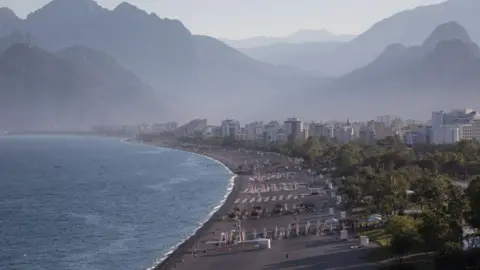 Chris McGrath/Getty Images
Chris McGrath/Getty ImagesThe COP31 climate meeting is now expected to be held in Turkey after Australia dropped its bid to host the annual event.
Under the UN rules, the right to host the COP in 2026 falls to a group of countries made up of Western Europe, Australia and others.
A consensus must be reached but neither country had been willing to concede. Australia has now agreed to support the Turkish bid in return for their minister chairing the talks following negotiations at COP30, currently being held in Brazil.
This unusual arrangement has taken observers by surprise. It is normal for a COP president to be from the host country and how this new partnership will work in practice remains to be seen.
Australian Prime Minister Anthony Albanese has called the compromise with Turkey an "outstanding result" in an interview with the Australian Broadcasting Corporation (ABC), noting Pacific issues would be "front and centre".
He added that he had spoken to Papua New Guinea Prime Minister James Marape and Prime Minister Rabuka of Fiji.
However, Papua New Guinea's Foreign Minister Justin Tkatchenko told the AFP news agency "we are all not happy. And disappointed it's ended up like this".
Solomon Islands leader Jeremiah Manele earlier told the ABC he would be "disappointed" if Australia didn't secure the event.
Despite this, there will be relief among countries currently meeting at COP30 in the Brazilian city of Belém that a compromise has been reached as the lack of agreement on the venue was becoming an embarrassment for the UN.
Australia has pushed hard to have the climate summit in the city of Adelaide, arguing that they would co-host the meeting with Pacific island states who are seen as among the most vulnerable to climate change and rising sea levels.
Turkey, which has proposed hosting COP31 in the city of Antalya, felt that they had a good claim to be the host country as they had stood aside in 2021 and allowed the UK to hold the meeting in Glasgow.
If neither country was willing to compromise then the meeting would have been held in the German city of Bonn, the headquarters of the UN's climate body.
As a result of discussions at COP30, a compromise appears to have been reached.
This includes pre-COP meeting will be held on a Pacific island, while the main event is held in Turkey. Australia's climate minister Chris Bowen will be its president.

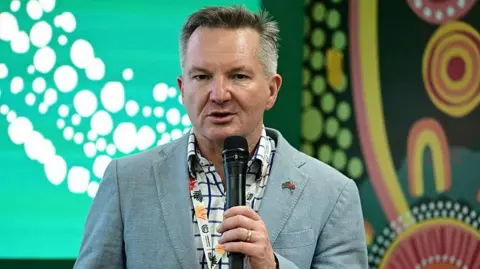 AFP via Getty Images
AFP via Getty Images"Obviously, it would be great if Australia could have it all, but we can't have it all," Mr Bowen told reporters outside the Australian delegation offices here in Belém.
"This process works on consensus, and consensus means if someone objected to our bid, it would go to Bonn."
"That would mean 12 months with a lack of leadership, no COP president in place, no plan, that would be irresponsible for multilateralism in this challenging environment."
Mr Bowen believes having a COP president not from the host country will work and that he will have the considerable authority reserved for the president of these gatherings.
"As COP president of negotiations, I would have all the powers of the COP presidency to manage, to handle the negotiations, to appoint co-facilitators, to prepare draft text, to issue the cover decision," he said.
He also confirmed to the BBC that Turkey will also appoint a president who will run the venue, organise the meetings and schedules.
Australia's climbdown will be embarrassing for the government of Mr Albanese, after lobbying long and hard to win support among the other nations in the Western Europe group.
The compromise will have to be ratified by more than 190 countries gathered here for COP30.
Given the difficulties in getting to this compromise, there are unlikely to be any objections.

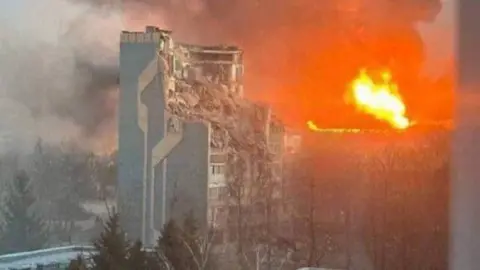 @zinkevich_igor
@zinkevich_igorNine people have been killed in Russian strikes on Ukraine overnight, Ukraine's president Volodymyr Zelensky has said.
Russia launched more than 470 drones and 47 missiles in the "brazen attack", he wrote in a post on Telegram.
Three districts of Ukraine's second city, Kharkiv, were hit by a massive drone attack which injured more than 30 people, including children. Photos posted online showed buildings and cars ablaze.
Power cuts are affecting a number of regions across the country, Ukraine's energy ministry said.
This breaking news story is being updated and more details will be published shortly. Please refresh the page for the fullest version.
You can receive Breaking News on a smartphone or tablet via the BBC News App. You can also follow @BBCBreaking on X to get the latest alerts.

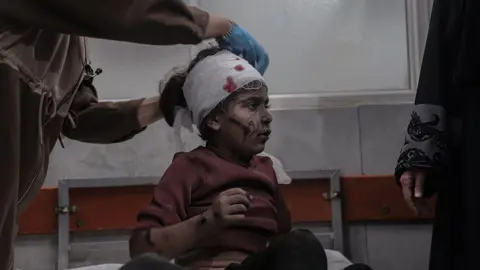 Anadolu via Getty Images
Anadolu via Getty ImagesAt least 25 Palestinians have been killed in Israeli strikes across the Gaza Strip, the Hamas-run health ministry has said.
Ten people, including a woman and a young girl, were killed when a ministry of religious endowments building in the eastern Zeitoun neighbourhood of Gaza City was hit, according to rescuers.
The Israeli military said it had struck "Hamas terrorist targets" after it said gunmen had opened fire towards an area where its soldiers were operating in the southern city of Khan Younis, in violation of the five-week-old ceasefire agreement.
There was no immediate comment from Hamas.
The flare-up of violence comes after the UN Security Council passed a resolution that endorsed US President Donald Trump's Gaza peace plan to end two years of devastating war.
Mahmoud Bassal, a spokesman for Gaza's Hamas-run Civil Defence agency, told the BBC that Israeli air, drone and artillery strikes hit several locations in Gaza City and Khan Younis shortly after sunset on Wednesday.
The attacks marked a sharp escalation after several days of relative calm, he said.
The Civil Defence reported that the strike in Zeitoun caused severe damage to the religious endowments ministry's building and surrounding structures, and posted a video showing its rescue workers appearing to find two people buried under rubble.
Photos published by the Anadolu news agency meanwhile showed the bodies of three young children reportedly recovered from the scene.
In a separate incident in Gaza City, one person was killed and several others were wounded when a drone struck a group of people at Shejaiya junction on Salah al-Din Street, Gaza's main north-south road, according to Mr Bassal.
He said another person was killed when a tank shell struck a house belonging to the Balboul family in Shejaiya's Mushtaha Street, which is also in eastern Gaza City.
In Khan Younis, three people were killed and a number were wounded in a strike on a group inside a sports club run by the UN agency for Palestinian refugees (Unrwa), he added.
In a statement, the Israel Defense Forces (IDF) said that "several terrorists opened fire toward the area where IDF soldiers are operating in Khan Younis" earlier on Wednesday.
"This action constitutes a violation of the ceasefire agreement. No IDF injuries were reported," it added. "In response, the IDF began striking Hamas terrorist targets across the Gaza Strip."
Israeli public broadcaster Kan cited a security source as saying the targets of the strikes were the commander of the Zeitoun Battalion of Hamas's military wing, the Izz al-Din al-Qassam Brigades, and the commander of its naval force.
On Monday, the UN Security Council passed a resolution that sought to shore up the fragile ceasefire, which took effect on 10 October.
Member states authorised the creation of a transitional governance body called the Board of Peace, which will be chaired by President Trump, and a temporary International Stabilisation Force (ISF), which will be tasked with ensuring "the process of demilitarizing the Gaza Strip".
Trump hailed the resolution as "a moment of true historic proportion".
A Hamas statement reiterated that the group would not give up its weapons without a Palestinian state, arguing its fight against Israel was legitimate "resistance".
Israel's ambassador to the UN stressed the importance of disarmament, saying that his country would "not stop or let up" until Hamas no longer presented "a threat".
The Israeli military launched an offensive in Gaza in response to the Hamas-led attack on southern Israel on 7 October 2023, in which about 1,200 people were killed and 251 others were taken hostage.
At least 69,500 people have been killed in Israeli attacks in Gaza since then, including 280 during the ceasefire, according to the territory's Hamas-run health ministry.

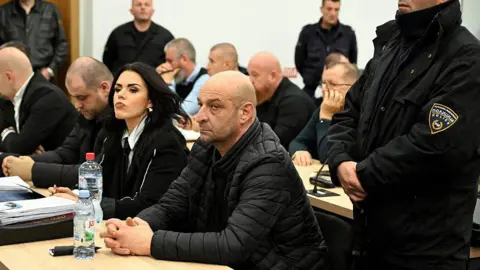 AFP
AFPThirty-five people and three institutions have gone on trial in North Macedonia over a devastating fire at a nightclub that killed 63, mainly young, people in March.
"I know about the pain of loved ones, we are all parents," Judge Diana Gruevska-Ilievska told the crowded courtroom, filled with defendants and dozens of victims' relatives. She promised the case would be conducted in a transparent and disciplined manner.
Club Pulse, in the eastern town of Kocani, was packed with young Macedonians attending a concert by a popular hip-hop duo when sparks from pyrotechnic devices set fire to the ceiling.
Prosecutors told the trial that years of failings had turned the club into a death trap.
Three former mayors of Kocani, the nightclub's owner and public licensing officials are among those charged.
They are accused of endangering public safety by allowing an unsafe venue to operate.
The judge warned the court that the trial could last for "five months or five years".
Defence lawyers attempted to delay the start of proceedings due to the charges being merged into a single case. The judge rebuffed them, ruling this did "not violate any rights of the parties".
At the time of the tragedy, authorities said only one proper exit was functioning at the club as the back door had been locked.
Sparks from the pyrotechnics spread quickly on the club's ceiling, which had been made of flammable material.
About 500 people were inside the club at the time, leaving 59 dead and some 200 others injured. Four of the injured died later. Many were unable to escape because of blocked exits.
Outrage after the fire prompted protests in the Macedonian capital Skopje and elsewhere, with victims' families organising local marches in Kocani itself.

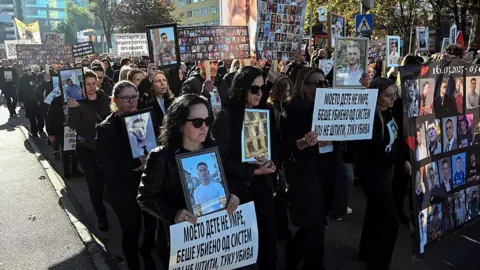 AFP via Getty Images
AFP via Getty ImagesAnother protest entitled "March of the Angels" took place in Skopje days before the trial began, organised under a Macedonian social media campaign called "Who's Next?".
Prosecutors told the trial that the Kocani disaster was not the result of one person's actions or mistakes - rather it arose out of a series of institutional failures and a lack of responsibility.
None of the defendants had wanted to face up to the danger that had been there for years, according to prosecutor Borche Janev.
Prosecutors allege that licences for the club were issued unlawfully, inspections were not carried out and overcrowding was allowed at the venue.
Another allegation is that there was no permit for the band to set off the pyrotechnic devices that started the fire.
"If we remain silent and lose the truth... we will never have the strength as a society to embark on a path to healing," Janev was quoted by local media as telling the court.

 NICOLAS TUCAT/AFP via Getty Images
NICOLAS TUCAT/AFP via Getty ImagesA prominent French anti-drugs campaigner whose brother was killed by drugs criminals last week, five years after the murder of his elder brother, has vowed to stand up to intimidation and "keep telling the truth about drugs violence".
Amine Kessaci, 22, was writing in Le Monde newspaper a day after the funeral of his younger brother Mehdi, whose murder last week has been described by the government as a turning-point in France's drugs wars.
"Yesterday I lost my brother. Today I speak out," he wrote in his opinion piece.
"[The drugs-traffickers] strike at us in order to break, to tame, to subdue. They want to wipe out any resistance, to break any free spirit, to kill in the egg any embryo of revolt."
Mehdi Kessaci, 20, was shot dead last Wednesday as he parked his car in central Marseille in what appears to have been a warning or punishment aimed at his older brother, Amine, from the city's drugs gangs.
Speaking after a ministerial meeting on drugs crime at the Elysée palace on Tuesday, Interior Minister Laurent Nuñez said: "We all agreed that this premeditated murder was something totally new. It's clearly a crime of intimidation. It's a new level of violence."
Mehdi was the second Kessaci brother to be killed by drugs criminals. In 2020 the body of Brahim Kessaci, then 22, was found in a burnt-out car.
That murder prompted Amine to launch his association, Conscience, which aims to expose the damage to working-class communities caused by gangs.
Marseille is renowned for worsening drugs wars, and Amine Kessaci recently wrote a book called Marseille Wipe your Tears – Life and Death in a Land of Drugs.

 AFP via Getty Images
AFP via Getty ImagesIn his Le Monde article, Amine revealed he was recently warned by police to leave Marseille because of threats to his life.
He attended his younger brother's funeral wearing a bullet-proof jacket and under heavy police protection.
"I speak because I have no choice but to fight if I don't want to die. I speak because I know that silence is the refuge of our enemies," he wrote, urging courage from citizens, and action from the government.
Mehdi Kessaci's murder has brought the national spotlight back on a drugs trafficking problem that French experts and ministers agree is reaching almost unmanageable proportions.
According to Senate member Étienne Blanc, author of a recent study, turnover in the drugs trade in France is now €7bn (£6bn) – or 70% of the entire budget of the justice ministry.
He said around 250,000 people drew a living from the trade in France – more than the entire number of police and gendarmes, which is 230,000. According to Le Monde, the country counts 1.1 million users of cocaine.
President Emmanuel Macron on Wednesday launched a broadside against such consumers, telling the weekly cabinet meeting that "sometimes it is the city-centre bourgeoisie that is funding the traffickers".
Macron had called a special drugs summit the day before in response to Amine's murder and in order to review progress on a new anti-drugs law that was passed in June.
It sets up a special prosecutor's office dedicated to organised crime - similar to the office that tackles terrorism - which will eventually have 30 specialised magistrates.
Under the law, senior drugs convicts are made to serve their terms in isolation in a specially converted prison where it is hoped it will be harder to continue running operations from behind bars.
According to Laurent Nuñez, there is evidence that the crackdown on drugs crime is having an effect - with the number of homicides in Marseille down from 49 in 2023 to 24 in 2024.
The number of dealing points in the city had halved from 160 to 80, he added.
"The war is not won, but we do have results."

 ALAIN JOCARD/AFP via Getty Images
ALAIN JOCARD/AFP via Getty ImagesAccording to the author of a recent book, Narcotraffic, Europe's poison, "France is at the heart of the geopolitics of drugs. With its two major ports of Marseille and Le Havre, it has an ideal geographical position in this Europe of free movement."
Mathieu Verboud said that the growth in world production of cocaine had triggered an "explosion of supply and demand. The market has gone through the roof and so have the profits."
The sheer wealth of drugs organisations meant they had the power to corrupt everyone from dock-workers to local politicians, the author warned, a process he said was already well-advanced in countries like the Netherlands and Belgium.
Several French politicians have said it is time to call in the army to deal with drugs-trafficking and the gangs which hold sway in many high-immigration city estates.
Christian Estrosi, mayor of the southern coastal city of Nice, said: "Narcotrafficking has transformed into narcoterrorism. Its aim now is to terrorise, subjugate and rule.
"We have already successfully deployed the means to fight terrorism. It's time to act with determination against narcoterrorism."
Estrosi was referring to wave of deadly jihadist attacks in the mid 2010s, when France deployed hundreds of soldiers on to the streets of many cities where they continue to patrol.

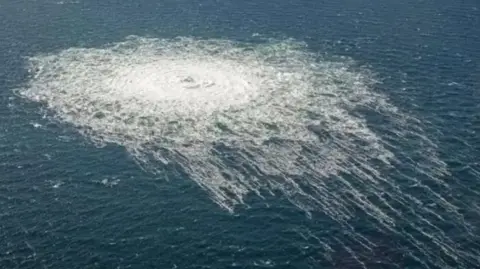 Danish Defence Handout
Danish Defence HandoutItaly's top appeals court has ruled that a Ukrainian man suspected of involvement in blowing up the Nord Stream gas pipelines between Russia and Germany should be extradited to Berlin.
There, former Ukrainian military officer Serhiy Kuznetsov will face a charge of anti-constitutional sabotage. He is due to be removed from Italy under German police escort in the next few days.
Prosecutors believe Mr Kuznetsov coordinated and led a group that planted explosives on the pipes deep beneath the Baltic Sea in 2022, though they have not disclosed any evidence.
The case has serious implications for relations between Ukraine and Germany, which is the biggest source of military aid for Kyiv in Europe.
Mr Kuznetsov's lawyer said his client "feels like a scapegoat" and is "very sad" that his government has not spoken out in his defence, or even confirmed that he was a serving soldier at the time of the blasts.
"If he carried out the attack, then he did so because he was ordered to do so because he was for sure a captain of the Ukrainian army," Nicola Canestrini said after Wednesday's hearing.
The BBC has seen a copy of Mr Kuznetsov's military ID among the court papers. He has not commented publicly on whether he was involved in the explosions.
"The Ukrainian government knows exactly where he was every day of September 2022," his lawyer said. "So, if he's innocent, why don't they say it? If he did it, why don't they say it? That's his question."
The BBC has approached government and security sources in Kyiv, but they have not commented.
Mr Kuznetsov was arrested in northern Italy in late August, at a glamping site near the city of Rimini where he had booked in for a few nights with his wife and two of their children.
His passport details were entered online at check-in, and in Italy that information is automatically transferred to the carabinieri, the local police.
Later that night, officers came knocking at the family's door.

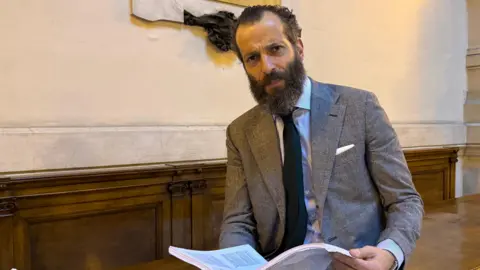
A month later, a second Ukrainian suspect was detained at his home close to Poland's capital Warsaw on another arrest warrant issued by Germany.
Volodymyr Zhuravlyov, an amateur deep-sea diver, has lived in Poland with his family since just before Russia's full-scale invasion of Ukraine in 2022.
He was held in custody for 17 days, but a court then refused to extradite him.
The judge delivered a passionate speech, arguing that no Ukrainian could be prosecuted for what he characterised as a legitimate act of self-defence against Russia's "bloody and genocidal" invasion of Ukraine.
In Italy, further from Ukraine, the mood and the politics are very different.
Mr Canestrini described the Italian appeal court's ruling as a "great disappointment", but said the fight for his client would now move to Germany - with the aim of having Mr Kuznetsov acquitted on the same grounds.
Many Ukrainians consider whoever did destroy Nord Stream to be heroes for taking out an important revenue source for Russia, and struggle to understand why Germany - a key ally of Ukraine - is pursuing this prosecution.
On Wednesday, one man stood outside the palatial courthouse in Rome wrapped in a Ukrainian flag and holding a poster that read: "Serhiy Kuznetsov is a defender, not a criminal."

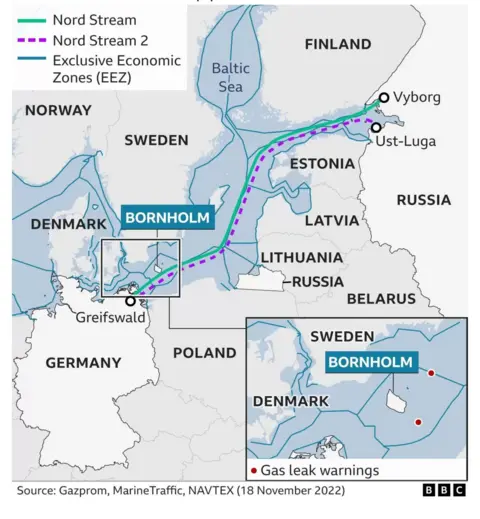

 Getty Images
Getty ImagesYounger Australian teenagers on Instagram, Facebook and Threads are being told their accounts will be shut down ahead of the country's social media ban for under-16s.
Meta, which owns the three brands, said it had begun notifying users it believes to be between 13 and 15 years old by text, email and in-app messages that their accounts would start being deactivated from 4 December.
The ban in Australia comes into force on 10 December. It affects a number of platforms which also include TikTok, YouTube, X and Reddit.
Prime Minister Anthony Albanese said the "world-leading" ban was aimed at "letting kids be kids". Meta and other firms oppose the measure but said they would comply.
Australia's internet regulator has estimated there are 150,000 Facebook users and 350,000 teens on Instagram in the 13-15 age bracket.
From 4 December, children aged below 16 will not be able to create accounts on Meta's social media platforms.
The company said it was asking young users to update their contact details so they could be notified when they became eligible to open an account.
They can download and save their posts, videos and messages before their accounts are shut down.
Meta said that teens who said they were old enough to use Instagram, Facebook and Threads could challenge the restriction by taking a "video selfie" to be used in facial age scans.
They could also provide a driver's licence or other government issued-ID.
All these verification methods were tested by the UK-based Age Check Certification Scheme (ACCS) earlier this year, in a report commissioned by the Australian state.
While the ACCS said that all methods had their merits, it added: "We did not find a single ubiquitous solution that would suit all use cases, nor did we find solutions that were guaranteed to be effective in all deployments."
Social media platforms which fail to take "reasonable steps" to block under-16s face fines of up to A$50m (£25m).
"While we are working hard to remove all users who we understand to be under the age of 16 by 10 December, compliance with the law will be an ongoing and multi-layered process," Antigone Davis, vice-president and global head of safety at Meta, told Reuters Financial.
Meta wants to see a law where under-16s have to get parental approval before they download a social media app.
The firm told Australia's Seven News: "Teens are resourceful, and may attempt to circumvent age assurance measures to access restricted services."
But it said: "We're committed to meeting our compliance obligations and are taking the necessary steps to comply with the law."
Australia's e-Safety Commissioner, Julie Inman Grant, said the ban was aimed at proctecting teens "from pressures and risks they can be exposed to while logged in to social media accounts".
In a move seemingly to avoid being included in the ban, gaming platform Roblox this week announced that children under 16 would be unable to chat to adult strangers.
Mandatory age checks will be introduced for accounts using chat features, starting in December for Australia, New Zealand and the Netherlands, then the rest of the globe from January.
The e-safety commissioner has published a list of which social media platforms will be impacted by the age ban.
They are:
Platforms not included are:

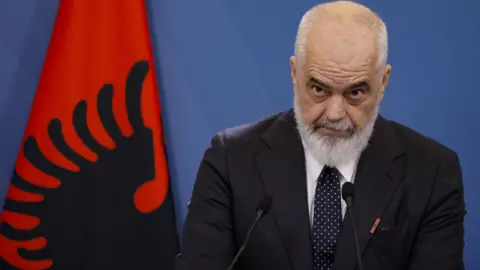 EPA
EPAAlbania's prime minister accused Home Secretary Shabana Mahmood of "ethnic stereotyping" after she singled out Albanian families in a speech about abuses of the asylum system.
Edi Rama criticised Mahmood for telling MPs around 700 Albanian families were "living in taxpayer-funded accommodation having failed their asylum claims" as she announced major reforms on Monday.
Rama called the number a "statistical drop in the ocean of post-Brexit Britain's challenges".
Official data show the UK has deported more than 13,000 people to Albania since a returns deal was signed in 2022. Rama called the deal one of "Europe's most successful partnerships on illegal migration."
Mahmood's comments came as she announced major changes to the UK's "out of control and unfair" asylum system.
Speaking in the House of Commons, Mahmood said: "If we fail to deal with this crisis, we will draw more people down a path that starts with anger and ends in hatred."
The reforms will make refugee status temporary, extend the wait for permanent settlement from five years to 20, and allow the removal of families with children who have no right to remain.
Alongside tightening access to refugee status, the UK would create new legal routes to the UK, with an annual cap on numbers.
As part of her speech, Mahmood told MPs "we must remove those who have failed asylum claims, regardless of who they are".
"There are, for instance, around 700 Albanian families living in taxpayer-funded accommodation having failed their asylum claims - despite an existing returns agreement, and Albania being a signatory to the European convention on human rights," she added.
Posting on social media, Rama said: "How can a Labour Home Secretary so poorly echo the rhetoric of the populist far-right – and single out 700 Albanian families, a statistical drop in the ocean of post-Brexit Britain's challenges – precisely at a moment when the UK and Albania have built one of Europe's most successful partnerships on illegal migration?"
"Let us also be clear: Albanians are net contributors to the British economy, and the number of Albanians receiving UK benefits is very low relative to other communities.
"To single them out again and again is not policy - it is a troubling and indecent exercise in demagoguery.
"Official policy should never be driven by ethnic stereotyping. That is the very least humanity expects from the great Great Britain."
Rama has repeatedly clashed with British politicians over their descriptions of Albanian nationals.
In May, Sir Keir Starmer travelled to the Albanian capital Tirana only to be told by Rama he would not host UK "return hubs" for failed asylum seekers from other countries.
During the same press conference, Rama accused the previous Conservative government of "stigmatising" Albanians and warning that "cursing the Albanians was not a good idea, because the curse went back and they are now out of the parliament".
A combative figure on social media, Rama has also previously invited Reform UK leader Nigel Farage to come to Albania to debate his claim one in 50 Albanians in Britain were in prison.
Rama dismissed the figure as "bonkers" and accused Farage of peddling "post-truth Brexit playbook" politics.


Sign up for our Politics Essential newsletter to keep up with the inner workings of Westminster and beyond.

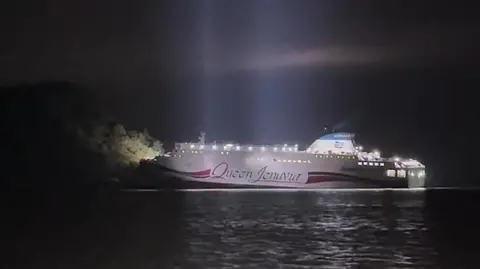 Yonhap News
Yonhap NewsA South Korean passenger ferry carrying 246 passengers and 21 crew has run aground on rocks off the country's south-east coast.
The Queen Jenuvia 2 is stuck on a reef and unable to move, but there is currently no risk of sinking or capsizing, according to the Coast Guard. People are currently being moved to patrol boats, it said.
The accident happened near Jangsan Island in Sinan County on Wednesday evening local time. The vessel ran aground on rocks near the uninhabited island of Jogdo.
Local media reported that five people sustained minor injuries from the impact of the grounding, but there have been no other casualties.
South Korean Prime Minister Kim Min-seok has ordered all available vessels to be mobilised to rescue the ferry.
"We have confirmed that there is currently no flooding. We are transferring passengers to patrol boats and moving them to a safe location," a Coast Guard official said, Chosun Ilbo newspaper reports.
The Coast Guard plans to move the vessel ashore at high tide.
The ferry was travelling to the port city of Mokpo after departing from the resort island of Jeju, carrying 246 passengers and 21 crew members, the Coast Guard.
The area is near the site of the sinking of the Sewol ferry in 2014 that killed more than 300 people, mostly school children heading for a school trip.
中国最大投资银行中金公司计划收合并两家规模较小的券商,旨在重塑中国证券业格局,并增强它与全球银行巨头竞争的能力。
中金公司星期三(11月19日)发布公告称,公司计划通过向东兴证券、信达证券全体A股换股股东发行A股股票的方式换股吸收合并东兴证券、信达证券。数据显示,三家券商合计资产超过1万亿元(人民币,下同,1838亿新元)。
三家公司的A股股票将在星期四(20日)开市时起开始停牌,预计停牌时间不超过25个交易日。
彭博社报道称,北京一直致力于培育能够与高盛、摩根士丹利等国际一流投行抗衡的国内顶级投资银行。中金公司指出,此次合并旨在加速打造世界级公司,推动证券业发展,更好地服务国家战略。
中国多年来一直考虑整合最大的国有投资银行,但进展一度停滞,直至中国国家主席习近平2023年敦促金融监管机构培育若干顶级券商。中国证监会也支持整合,目标是在2035年前形成两到三家具有全球竞争力的银行。
中金公司说,通过整合各方优势和资源,合并将实现规模经济、提升效率,并打造更具多元化和竞争力的金融服务平台。
彭博数据显示,中金公司是中国在香港IPO承销领域的顶级投行,今年在港上市股票承销排名第一。在中国国内市场竞争激烈的背景下,中金公司自2018年以来未再位列IPO承销榜首。
中金公司成立于1995年,注册资本48.3亿元,业务涵盖证券、外汇及资产管理。东兴证券与信达证券均成立于2000年代,注册资本各为32亿元,具备强大的零售和机构经纪业务能力,并在承销、自营交易及基金管理方面经验丰富。
中国总理李强抵达赞比亚时说,中国愿同赞比亚深化互利合作,加强多边沟通协调,团结全球南方国家共同维护国际秩序和公平正义。
据中国驻赞比亚大使馆微信公众号消息,中国驻赞比亚大使馆韩镜上周在赞比亚主流媒体发表的署名文章中说,中国国务院总理李强将于11月19日至20日对赞比亚进行正式访问。此访是中国总理28年来首次访问赞比亚,也是总理李强就任以来首次访问撒哈拉以南非洲国家。
据新华社报道,应赞比亚政府邀请,李强当地时间星期三(11月19日)晚乘包机抵达卢萨卡国际机场,开始对赞比亚进行正式访问。
李强抵步后说,赞比亚是南部非洲首个同中国建交的国家。长期以来,无论国际风云如何变幻,中国和赞比亚始终相互尊重、相互信赖、相互支持,共同铸就了包括坦赞铁路精神在内的中非友好合作精神。近些年,在中国国家主席习近平和赞比亚总统希奇莱马战略指引下,两国政治互信持续深化,各领域合作成果丰硕。
李强指出,去年9月中非合作论坛北京峰会期间,两国元首举行会晤,为进一步深化中赞全面战略合作伙伴关系指明了方向。中国愿同赞比亚一道继续努力深化互利合作,促进两国人民相亲相知,在实现现代化的道路上携手前行。面对当今变乱交织的世界,中国愿同赞比亚加强多边沟通协调,团结全球南方国家一道,维护国际秩序和公平正义。
据路透社报道,中国是赞比亚最大的官方债权国,赞比亚累计债务高达57亿美元(74亿新元)。北京希望借此次访问展示赞比亚作为“一带一路”倡议的典范国家,并显示在中国帮助下,非洲国家能够摆脱债务困境。
报道称,李强此次访问旨在加深中国在铜矿资源富集的赞比亚的影响力。随着目前赞比亚130亿美元债务重组走上可持续偿还轨道,欧美正努力与中国竞争当地的发展空间。
中国驻赞比亚大使馆韩镜在署名文章中介绍,李强这次访问行程不仅是对多年来两国在双、多边领域合作成果的确认,中国也将借此机会提出进一步推进中赞合作的新举措、新倡议。预计此访将达成十余份成果文件。
此前,应俄罗斯总理米舒斯京邀请,李强11月17日至18日出席在莫斯科举行的上海合作组织成员国政府首脑(总理)理事会第二十四次会议。结束赞比亚访问行程后,李强将于11月21日至23日出席在南非约翰内斯堡举行的二十国集团(G20)领导人第二十次峰会。
中国外长王毅与吉尔吉斯斯坦总统扎帕罗夫会面时说,中国愿同吉尔吉斯斯坦加强战略沟通对接,拉紧经济合作纽带,高质量建设好中吉乌铁路,全方位提升合作水平。
据中国外交部网站,王毅于当地时间星期三(11月19日)在比什凯克与扎帕罗夫(Sadyr Japarov)会面时说,中国永远是吉尔吉斯斯坦可信赖的朋友、可倚重的伙伴,愿同对方将合作蓝图转化为具体行动,大踏步实现各自现代化,不断丰富中吉新时代全面战略伙伴关系内涵。
他还说,中国愿同吉尔吉斯斯坦共同努力,以构建更加紧密的中吉命运共同体为目标,加强战略沟通对接,拉紧经济合作纽带,高质量、高标准、高效率建设好中吉乌铁路,构建更加完善的互联互通体系,加快培育清洁能源、数字贸易、绿色矿产等合作新增长点,深化人文交流互鉴,全方位提升合作水平。
王毅续指,中国高度评价吉尔吉斯斯坦在中国—中亚机制中发挥的建设性作用,愿同吉方加强在联合国等多边平台的协调合作,共同践行四大全球倡议,推动构建更加公正合理的全球治理体系。
此外,王毅同日还与吉尔吉斯斯坦外长库鲁巴耶夫举行首次中吉外长战略对话。王毅在会上说,中吉乌铁路吉方境内段全线开工,别迭里口岸阶段性通车,新航线近日开通,全方位合作水平不断提升。
他还指出,双方要进一步挖掘合作潜力,加强口岸基础设施建设和现代化改造,尽早建立口岸管理合作委员会,便利跨境运输;加快商签服务贸易和投资协定,积极落实绿色矿产领域投资合作协议;发挥好中国文化中心、孔子学院、鲁班工坊等平台作用,加强旅游、减贫、医疗、地方、教育等领域合作,夯实民意基础;强化反干涉、反渗透合作,促进反恐情报交流,打击贩毒和跨国有组织犯罪。
会谈后,双方发表《中华人民共和国和吉尔吉斯共和国外交部长首次战略对话联合声明》。根据声明,中吉双方还讨论了在吉尔吉斯斯坦南部这一中亚贫困地区开通国际航空通道,并增设中国西北城市喀什与比什凯克、奥什的直飞航班。
中吉乌铁路项目起自中国新疆喀什,经吐尔尕特山口进入吉尔吉斯斯坦,再向西经吉尔吉斯斯坦边境城市贾拉拉巴德,终至乌兹别克斯坦东部城市安集延。
据香港《南华早报》早前报道,这条铁路全长523公里,最终可能将延伸至中东、南亚和欧洲。分析人士称,该项目将在深化中国与中亚及其他地区的关系方面发挥重要作用。

© Haiyun Jiang/The New York Times
本周在华访问的德国副总理兼财政部长克林拜尔说,他支持自由市场,但竞争必须建立在公平基础上;如果中国的国家补贴产品冲击欧洲,欧洲市场必须得到保护,不能因此成为“输家”。
据路透社报道,克林拜尔(Lars Klingbeil)星期三(11月19日)在上海受访时说:“我支持自由开放的市场,但我不希望欧洲和德国最终成为输家。”
他提到,欧洲钢铁企业正面临压力,欧盟已提出对从中国等国进口的钢铁征收新关税,以保护本国产业。
克林拜尔指出,他不愿看到德国钢铁行业因中国的国家补贴钢铁而受到冲击,并称德国钢铁业基础扎实,正迈向二氧化碳中和。
克林拜尔上星期天(16日)启程访华,并于星期一(17日)与中国副总理何立峰在北京共同主持第四次中德高级别财金对话。双方达成27项共识,包括反对单边主义和贸易保护主义。
克林拜尔说,尽管中德之间存在分歧、竞争甚至对立,但两国关系“仍有可能相对良好地运作”。
对于欧盟内部是否对中国采取更强硬立场的问题,克林拜尔说,中国议题在欧盟经济与财政事务理事会(Ecofin)和欧元集团会议上愈发受到重视,欧盟应对中国“展现统一立场”。
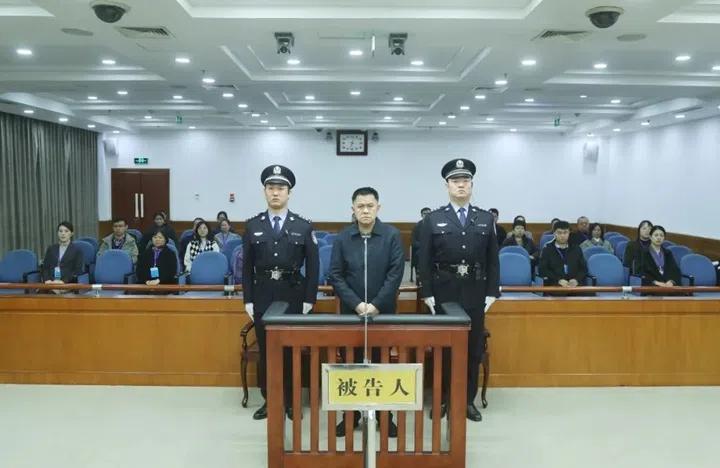
中国官方通报,中国国有控股上市寿险公司、新华人寿保险原董事长李全涉贪污受贿,一审被判死缓。
中国最高人民法院星期三(11月19日)在官方微信公众号上通报,山东省济南市中级法院当天一审公开宣判新华人寿保险股份有限公司原党委书记、董事长李全贪污、受贿案,对李全以贪污罪判处无期徒刑,剥夺政治权利终身,并处没收个人全部财产;以受贿罪判处死刑,缓期二年执行,剥夺政治权利终身,并处没收个人全部财产,决定执行死刑,缓期二年执行,剥夺政治权利终身,并处没收个人全部财产。对追缴在案的李全贪污所得财物返还被害单位,不足部分继续追缴,对追缴在案的李全受贿所得财物及孳息依法上缴国库。
法院审理查明,李全在2015年6月至2024年3月利用担任新华资产管理股份有限公司总裁、董事长,新华资产管理(香港)有限公司董事长职务上的便利,伙同他人以非法占有为目的,采用欺骗、隐瞒等手段,非法占有相关业务收益,共计折合1.08亿余元(人民币,下同,2000万新元)。2010年至2023年,李全利用职务上的便利,为有关单位和个人在业务合作、基金认购等方面提供帮助,单独或伙同他人非法收受财物共计折合1.05亿余元。
法院认为,李全贪污受贿数额均特别巨大,使国家和人民利益遭受特别重大损失,均应依法惩处,并予数罪并罚。鉴于他贪污、受贿犯罪中均有未遂情节;到案后如实供述自己罪行,主动交代办案机关尚未掌握的部分受贿事实;认罪悔罪,积极退赃,他贪污、受贿实际所得财物及孳息已追缴,依法可以对他从轻处罚。法庭遂作出上述判决。
公开资料显示,现年62岁的李全曾长期在金融行业工作,1988年7月起先后任职于中国农村信托投资公司、正大国际财务有限公司,1998年入职博时基金历任督察长、副总经理等职。2010年,李全出任新华资产管理股份有限公司总裁,2019年任新华保险首席执行官,2022年9月至2023年4月先后担任新华保险第七届、第八届董事会董事长,同年8月因年龄原因辞去全部职务。
中国媒体去年4月引述消息报道,李全可能将“出事”的消息已在圈内流传数月。同年9月,官方通报李全严重违纪违法,被开除中共党籍。通报指他毫无纪法底线,肆无忌惮靠金融吃金融。去年10月,检察机关对他作出逮捕决定,今年1月对他提起公诉。法院今年5月公开开庭审理上述案件,李全当庭认罪悔罪。
中国部署开展知识产权代理行业专项整治,集中整治不规范执业行为。
据中国央视新闻报道,国家知识产权局等三部门部署开展知识产权代理行业专项整治,严厉打击违法违规行为,集中整治不规范执业行为,强化源头治理,推动专项整治工作取得实效。
人民财讯也报道,知识产权代理行业专项整治行动动员部署会已在上星期五(11月14日)于北京召开。
会议形容知识产权代理是知识产权事业发展的重要支撑,并强调要深刻认识知识产权代理行业专项整治工作的重要性和紧迫性,准确把握目标任务,严厉打击违法违规行为,集中整治不规范执业行为,强化源头治理,全力推动专项整治工作取得实效,为知识产权事业高质量发展夯实基础。
台湾的大陆委员会星期三(11月19日)强调,政府从未要求台湾民众提供个人资料,查询是否曾领用中国大陆居民身份证,呼吁民众勿上当。
台湾《联合报》报道,赖政府扩大清查台湾民众是否领有大陆身份证件,却遭诈骗集团盯上,冒名骗取民众个资。
陆委会在官网新闻稿中说,陆委会接到陈情通报,有诈骗集团疑似利用移民署名义,以怀疑可能领用大陆身份证件,要求当事人点选连结网址。
陆委会指此为诈骗手法,呼吁民众不要任意拨打电子邮件内的电话、点击相关连结或登录特定网站,避免上当受骗。
陆委会也说:“政府从来没有利用电子邮件或网页,提供民众自由查询是否曾领用中共居民身份证件。陆委会已经通报刑事警察局等主管机关,及时启动网页阻断及刑事查处。”